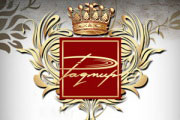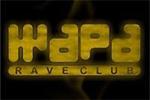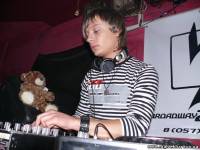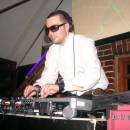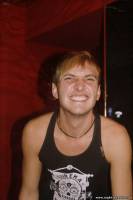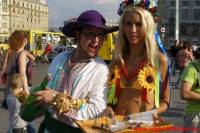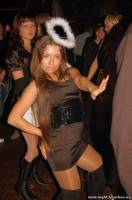Биография RICARDO VILLALOBOS Biography 
BORN
"Santiago de Chile, 1970"
FAMILY
"At the age of three I moved to Germany. There was a military coup [General Augusto Pinochet overthrew the democratic government of Salvador Allende in 1973] and we had to go, it was a forced situation. My mother is German so that was an easy decision. I found Germany to be very nice. For sure it was complicated, and I had problems with the culture and the language at first, but after a while I found out how to behave in Germany, how to fix those problems, and then it was really cool. My whole family is extremely musical. My Uncle, my Grandma, my step-Mother... it is called a family parra; a traditional, musical family. Also around me was a collection of scientists, mathematicians; my Father and Grandpa. It was a complete division between mathematics and music. Now, I hear some people saying that music is like 'the mathematics of feelings'. I believe there is something like a brotherhood between music and mathematics."
MUSICAL ROOTS
"When I was ten or eleven I started to play conga and bongos. Music was something I loved but I never thought that I could be a musician. I started in the late eighties making electronic music, and DJing too. When I was twelve I became the biggest Depeche Mode fan. I was everywhere that they were in Europe, travelling with them. My interest in electronic music came from Depeche Mode, for sure. For me they were like the Beatles of the eighties, with electronic instruments. It was one of the bands responsible for making electronic music popular. In '81 and '82 they had lots of four-to-the-floor stuff, ten or eleven minute mixes of tracks, and they were the first to do it. Daniel Miller was doing techno in the early eighties too, and he, of course, signed Depeche Mode to his Mute label. You can mix those records with techno tracks. In the beginning people complained about Depeche Mode. They said, 'They don't play the music how it sounds on record.' But after a while people understood it, and Depeche Mode need to be credited with helping this music find popularity. For me personally, I'd also credit Baby Ford, Thomas Melchior, Daniel Bell, Andrew Weatherall for sure, and Richie - the whole Plastikman and Fuse stuff at the beginning, especially; the Plastikman records were just crazy in the early nineties - as being my biggest influences, alongside some house artists, in particular Derrick Carter. Brazilian music is the biggest influence I have. Brazilians were listening to techno two or three hundred years before anyone else. If you compare the samba groove to the techno groove it has a really, really similar idea behind it. I think South American music is important because of the rhythm, but also the melody. It relates to the living, the reality that people have in South America. You have many things to be sad about, but the general outlook is one of happiness. It's a very special mixture and mentality. The people are making these melodies that exist exactly between sadness and happiness, and also the rhythm thing creates happiness. People use music to forget their problems. I was listening to this music with my parents at home the whole time, and the influence is very, very pronounced. Brazilian music; Salsa; Cuban music; the music of the Andes - Chile, Peru, Bolivia - all these things; Tango for sure; Argentinean Astor Piazzolla; all of it. These melodies are full of passion, happy and sad at the same time, it leaves something very strong in your mind."
FIRST PROJECTS
"In the beginning it's like a hobby. DJing paid something between one hundred and five hundred Euros. You couldn't live out of it. I was studying at University and doing parties and stuff, but more or less doing this as something I just enjoyed. Then we started a little label in '93 called Placid Flavour... it didn't go very well, so, we started again. I met the Playhouse people in '93 and made my first record for them in '94. In '95 and '96 I started to be more serious, also with DJing. Since '98 this has definitely been a career. I've only done this to earn money. I need to live, and I need to work hard. It's quite late: some people get known at 22 and 23 for being DJs. This didn't happen to our generation; our generation took a lot longer and it wasn't that easy to get musical information and good records. Now you have high standards of production and a lot of people to learn from. You get your information in big packages, you get told a lot at once. Friends tell you now, whereas [people from] our generation were on their own. Maybe a few people had listened to Dance Mania or Trax records and things like that but now everybody says 'Detroit is one of my biggest influences, even if you're 23 years old. You can get the information to work it all out. It took me ten years from getting my first money, to realise that I'd be able to live from doing this, that it's the centre of my life, the reason I stay living. If things grow slowly, and you stay where you have always been much longer, you don't fall as fast. Everyone is talking like this now, all the good artists, it's like a rule. It's the much better way."
LABELS AND PRODUCTION
"I have a few main labels: Perlon, Playhouse, and a couple owned by friends like Luciano. Perlon and Playhouse are enough: I have so much to do, I have to DJ and produce like hell. It is impossible for me to start a label for example. It's also not necessary. The world of labels will shrink a little bit. The reality is that labels are disappearing, distribution is disappearing, vinyl is getting harder and harder to live with. It's important to give all my energy to Perlon and Playhouse and not somewhere else, I won't go and make an album for another label."
DJING
"I have always DJed the same way. I don't jump around, and make a big show, and scream or whatever. Things like that are not my style. You have to be very concentrated, but also you have to be in the mood of the people, that is very important. Being relaxed is good, and it means you can play a little more abstract stuff in-between the stuff that people are more likely to be expecting. Everyone has a style and mine has always been like this."
FABRIC
"For me it's incredible to be able to play at Fabric so often. It's the best sounding club in the world. The atmosphere is really nice, the concept is really nice, that there are three floors, each a completely different world. You enter each room and it is like it is swallowing you, it's something that doesn't happen in big rooms very often. If I am asked to play in a club where two thousand people attend in one night I normally say 'No, no way, too much'. The first time I came to Fabric I was completely surprised at how separate and how isolated each of the worlds are. You can decide on where to go depending on how you feel, and the line ups are good and different. It's a music lover's concept, and the people that do fabric are music lovers. And it has a lot of support from the underground: that isn't very common for a big club at all."
THE FUTURE
"It's important to make the club thing happen in Berlin, to develop our scene, and there are so many incredible musicians here in Berlin that it will start to happen. We will all begin to work together, in different and strange mixtures. People that don't know one another will begin to work together. We are all going to the same parties, listening to the same music, dancing to the same music; all these people will work together and it will be really fertile and interesting. Richie is here; Thomas Melchior; Baby Ford is here every three weeks; Luciano is coming. It's a worldwide net of close friends that are heading for the same thing. Berlin is where everyone meets. It's a big city, not a small one, it's the only big city that we Germans have. It's really, really nice and it's cheap to get a flat. I want to be here more and not travel so much, I really want to be here."




